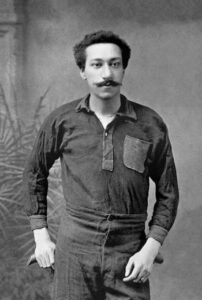
Arthur Wharton, 1896
*Arthur Wharton was born on this date in 1865. He was a Black British football player.
Wharton was born in Jamestown, Gold Coast (now part of Accra, Ghana). His father, Henry Wharton, was a Grenadian missionary of Scottish and West African descent, while his mother, Annie Florence Egyriba, was a member of the Fante Ghanaian royalty. Wharton moved to England in 1882 at age 19 to become a Methodist missionary but soon abandoned this to become a full-time athlete.
He is one of the first Black professional soccer players in the world. Wharton may have been the first Black professional and the first to play in the Football League. He was an all-round sportsman; in 1886, he equaled the amateur world record of 10 seconds for the 100-yard sprint in the AAA championship. Wharton was also a keen cyclist and cricketer, playing for local teams. However, Wharton is best remembered for his exploits in soccer, while he was the first mixed-heritage footballer to turn professional and suffered severe racial discrimination.
Having developed a drinking problem, Wharton retired from football in 1902 and found employment as a colliery haulage worker at the Yorkshire Main Colliery in Edlington. By 1911, he was a collier living in Moorthorpe, West Yorkshire, with his wife Emma. During World War I, Wharton joined the Volunteer Training Corps (Home Guard), volunteering to give his life in defense of Britain if called upon. Arthur Wharton died on December 12, 1930. His grave was given a headstone in 1997 after a campaign by anti-racism campaigners Football Unites, Racism Divides.
In 2003, Wharton was inducted into the English Football Hall of Fame. A campaign to erect a statue in Darlington and Rotherham to acknowledge Wharton's achievements has gained wide support within the professional game. In 2012, a small Wharton statue was at FIFA's headquarters and is on permanent display. In October 2014, a statue honoring Wharton was at St George's Park National Football Centre. In 2020, a mural was unveiled in Darlington on Arthur Wharton's 155th anniversary.